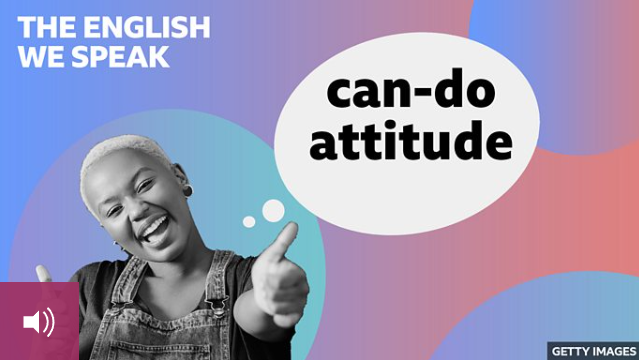Introduction
If you have a can-do attitude, you don’t let anything stop you. Learn how to use this expression here.
Feifei
Hello. Welcome to The English We Speak, where we explain phrases used by fluent English speakers so that you can use them too. I’m Feifei, and I’m feeling so good today.
Phil
Why’s that?
Feifei
Well, this morning, I’ve been for a run, tidied my house, made a healthy lunch to bring in, and done some language study. I came in to work and cleared my inbox – I answered every single message.
Phil
Wow, I woke up late, drank too much coffee and stumbled into work somehow. Now, I’m just worried how I’ll get everything done.
Feifei
Oh, don’t worry, it’s easy. You just have to have a can-do attitude. Tell yourself you can do it, keep smiling and get it done!
Phil
Well, the first thing I’m going to do is point out that ‘can-do attitude’ is a great expression to learn. If you have a can-do attitude, you believe that can get things done, and do them enthusiastically. Feifei, your can-do attitude today is quite impressive.
Feifei
Yes, if problems don’t worry you – you just work through them happily, then you have a can-do attitude.
Phil
Listen to these examples of people using the expression ‘can-do attitude’.
Examples
I’ve got guests coming over and I need to clean the whole house. I just need a can-do attitude to get it all done.
I just hired someone new for the team. She had a real can-do attitude. The others were a bit lazy.
I’m trying to learn a new language, and I guess I need a can-do attitude to get me through the first two lessons.
Feifei
‘Can do attitude’ is a common expression, but it is also possible to use ‘can-do’ as a compound adjective before other similar nouns. For example, you could talk about someone’s ‘can-do spirit’, or ‘can-do mindset’ or ‘can-do way of thinking’.
Phil
It’s informal, and more common in American English – but it is also possible to use ‘can do’ as a noun. You could say, ‘she showed a lot of can do on that project’.
Feifei
A can-do attitude can really help you improve your English, so why not start by coming back next time to learn another English expression. See you then!
Phil
Bye!
